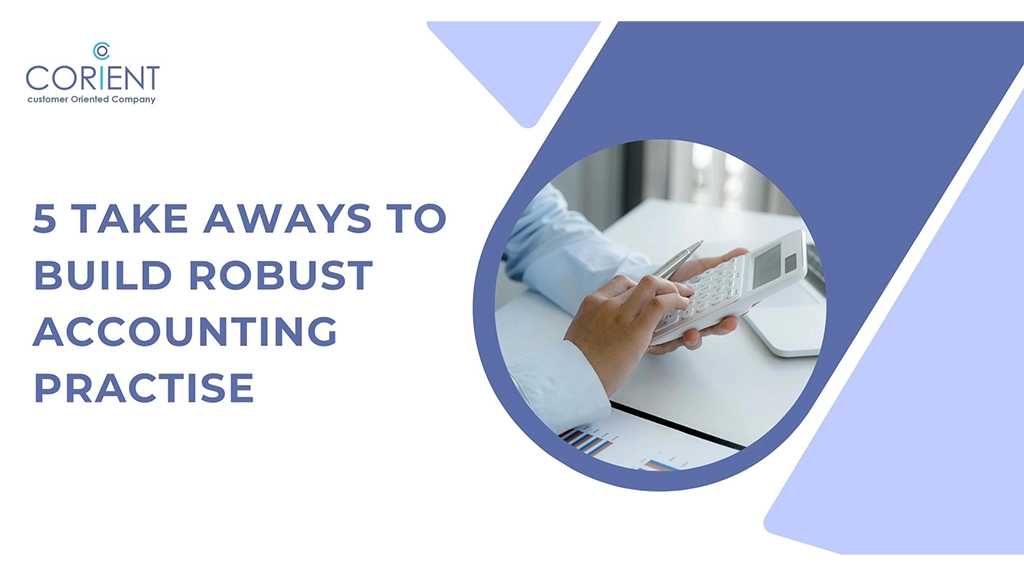
5 Takeaways to Build Robust Accounting Practise
2024 is an optimistic year for accountants who are interested expanding their accounting practise. You know why? Because you will come face to face with existing and new opportunities, and taking full advantage will lead to business consolidation and expansion of your accounting practice. But these opportunities will only be helpful with regular skill and process upgradation.
With a highly competitive accounting field and a mix of new technologies and processes, surviving and expanding through outdated methods is impossible. You must adopt advanced and updated techniques and technologies to survive and thrive. We have created a bunch of points that will be pretty helpful for you.
Upgrade the Skills of your Staff
Make it a point to constantly upgrade your staff’s skills by updating them about new technologies in the world of accounting via weekly, monthly, and yearly meetings. Prepare training programs where your team will train in new technologies like machine tools, artificial intelligence, and blockchain. By encouraging a learning culture, you enable growth in your accounting practise.
Adopting New Technologies
With time, clients’ expectations of you increase with regard to services. To meet these expectations, you will need the help of advanced technologies that must be integrated into your system. You can increase productivity and efficiency by adopting software like Xero, QuickBooks, Dext, Senta, Glide, Hubdoc, and Spotlight/Fathom. By incorporating new technologies, you offer your clients fast, accurate services that meet their dynamic requirements. Always select technologies that can easily integrate and streamline your process.
Design Process for Each Department
It is essential to decide in advance the processes for each department within your accounting practise. By developing protocols, procedures, and documentation, you ensure consistency, minimize errors, and maintain proactiveness from your side. For instance, by making a rule to send email alerts immediately after filing Quarter 4 VAT returns and after sending reminder calls, you are making sure that your client is aware of future deadlines. Also, by sending clients an already prepared list of documents, you can streamline the accounting process. By following this point, you are proactive in offering client services rather than staying reactive.
Key Performance Indicators
Your target should always be to offer top-notch services to your clients. But how are you going to rate your services? Well, it’s through KPIs (Key Performance Indicators). Select the relevant parameters as your KPIs and measure your services with them. These indicators can be
- Recovery rate per hour
- Cost per hour,
- Percentage of accounts filed within 90 days
- VAT returns completed within 25 days
- Management accounts sent to clients within 20 days can significantly contribute to ensuring timely service delivery
By constantly comparing your services with these KPIs, you can identify where your services are lacking and take corrective measures. By following this point, you can enhance your services and meet client’s expectations. We can understand that maintaining services as per the KPI standards is a challenging task and can also divert your resources from your primary tasks. To avoid that, you can delegate this responsibility to an accounting outsourcing service provider, such as Corient Business Solutions.
Develop Monitoring Tools
Regular monitoring of real-time data helps detect irregularities and ensure compliance, which can be done through a centralised dashboard. A centralised dashboard gives you a real-time overview of the practise. It will enable you to smoothen communications and business development. Also, implement specific indicators in the dashboard for early warning to identify issues as early as possible. These indicators could be audit trails and automated alerts for discrepancies, to name a few. To summaries, a dashboard helps manage practise operations and aids in efficient decision-making and detecting irregularities.
In conclusion, following KPIs, upgrading staff skills, adopting new technologies, working on processes, and regular monitoring will lead to long-term success and growth of your accounting practice. You can follow these points that can consume your time and resources or identify and outsource these tasks to an accounting outsourcing service provider that strictly follows these points.
Frequently Asked Questions
1. What technologies should an accounting firm prioritise?
Accountants must incorporate cloud-based accounting software, AI-driven automation tools, and data analytics solutions within their systems to streamline processes and gain real-time insights.
2. What’s the significance of developing Key Performance Indicators (KPIs) in accounting?
Through Key Performance Indicators, you can measure your services through measurable metrics, take corrective measures if required, and align them with your business goals. Through the decided metrics, you can get an insight into various aspects of your practise and make informed decisions.
3. How can I stay updated with changing accounting regulations?
Keep a close watch on evolving accounting standards such as UK GAAP. Also, watch the HMRC website for changes in tax laws and regulations. Invest in continuous education and professional development, and be engaged with the industry and seminars for updates.

